Should child sex offenders be allowed to travel?
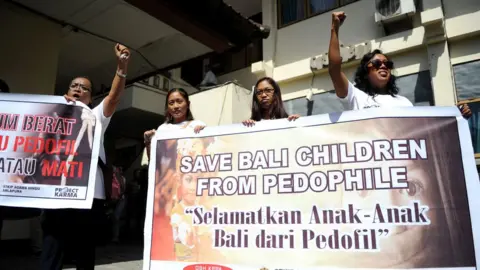 AFP
AFPAustralia has passed tough, "world-first" legislation that will deny passports to about 20,000 people on the national child sex offenders register. The aim is to stop Australians who are planning to abuse children in regions like South East Asia before they even get on a plane. But how will it work, is it fair and will other countries follow suit?
Close to 800 people on the register left Australia in 2016 - and nearly 40% of them had been convicted of offences against children under the age of 13, the government says.
Many went to poor countries in Asia that are common holiday destinations for Australians, but also magnets for sex tourism.
Senator Derryn Hinch, an outspoken former talk radio host who pushed for the legislation, said he wanted to end "child rape holidays" to places like Myanmar, Cambodia, the Philippines and Indonesia.
"This is one of the greatest days of my life," he said in the Senate as the legislation passed.
At present those on the register - which is not publicly available - are allowed to travel but must notify local authorities before they do so. Australia in turn notifies the destination country.
But the government says the system has not worked effectively enough and the new rules will make Australia a "world leader" in protecting vulnerable children.
Always a sex offender?
There are 3,200 people on the register for life who will now never be able to get a passport. Others will lose their right to travel only while they remain on the register.
Offenders will be able to apply for a temporary travel document to leave the country in case of an emergency - such as a dying family member abroad - and those already overseas will be allowed to return home.
The law has been welcomed by groups that track sex offenders in the region, and passed parliament with bipartisan support, but there are also critics.
They say the broad nature of the legislation will take away the right to travel overseas from many people who might never re-offend, including hundreds of young people who find themselves registered for offences like "sexting".
The logic of the law, critics say, is predicated on the idea that sex offenders never change, even after treatment or jail time. They argue it still won't stop many crimes committed by opportunistic travellers with no prior convictions.
It is "based on the belief that someone who is once a sex offender is always a sex offender," says Tamara Lave, an associate professor of law at the University of Miami and a former public defender.
While she acknowledges that some registered offenders would pose a significant risk to children abroad if allowed to travel, the problem with the legislation in her view is that it represents "the legislature taking the decision away from a judge".
Passports should be stripped from people on a case-by-case basis and dependent on how much risk the individual is deemed to pose by a court, she says.
"The problem of the bill is that it looks at a whole class of offenders - 20,000 people - and what they deserve."
'You lose your civil rights'
Prof Lave has been critical of a US law enacted in 2016 which places a permanent stamp in the passports of registered child sex offenders so foreign immigration authorities can make a decision to let them in or not.
Like groups including Human Rights Watch, she argues that sex offenders have low recidivism rates. She points to a 2003 US justice department study that found of 9,691 male sex offenders (including 4,295 child molesters) released from prisons in 15 states in 1994, only 5.3% were re-arrested for a sex crime within three years.
But others argue that many re-offenders will not be caught.
Senator Hinch's response to criticisms made on human rights grounds is unequivocal.
"My attitude is if you rape a child you lose some of your civil rights," he told the BBC World Service.
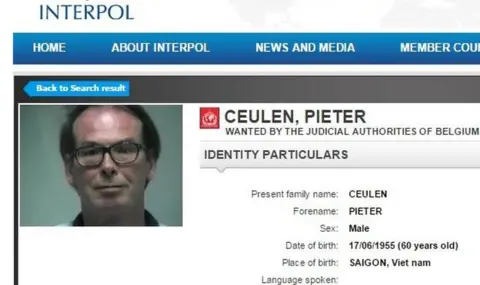 Interpol
InterpolAnti-paedophile groups in South East Asia like Action Pour Les Enfants (APLE) say that Australia is taking the lead on an important issue that other countries should follow.
In Cambodia, APLE works with police to track down child sex offenders and says it helped arrest 187 foreigners suspected of child sex offences between 2003 and the 2015 - a time period that saw a boom in tourism to the country.
Of the 115 foreigners who ended up being convicted, APLE was only able to determine if 43 of the offenders had a previous conviction - and 26 did.
Between 2003 and 2017, the group says it helped to arrest 43 Americans, 29 French citizens, 23 Britons, 12 Australians, 12 Germans, 10 Dutch people, eight Swiss and five Canadians, in addition to nationals from Austria, Belgium, Sweden, Russia, Japan, South Korea and elsewhere. (Locals are believed to be responsible for the majority of child sex offences committed in Cambodia and the region, but APLE's work focuses on foreigners.)
Although child sex tourism has been pushed underground in Cambodia in recent years due to large-scale awareness campaigns, "you still have foreign nationals coming over here thinking they can commit crimes", says Jim McCabe, a former Australian police officer who works with Cambodian police investigating crimes against children.
"This initiative will prevent [convicted sex offenders] from even coming here. It's a bold move that should be applauded."
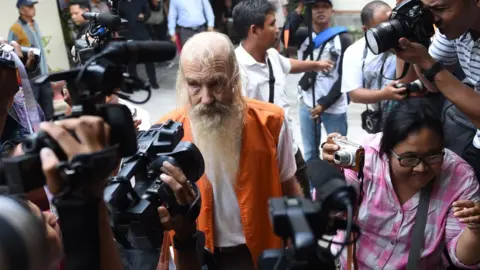 AFP
AFPPolice data shows that 250 Australian registered child sex offenders entered the Philippines in 2014.
The island of Bali in Indonesia, a hotspot for Australian tourists in general, is also a destination. But registered offenders are reported to have been increasingly turned away at the border in recent years after tip-offs from Australian authorities.
"I don't think it's fair to say that every single one of them is going there to commit crimes, but on the whole they are not going for the beaches," says Glen Hulley, the founder of Project Karma, a group combating child sex exploitation in Indonesia and the Philippines.
He says his organisation has seen information being shared online detailing what villages in remote areas of Bali should be targeted, how much money should be paid to families and how to bribe police if caught.
"[They know] it's a lot easier to get away for these crimes overseas."
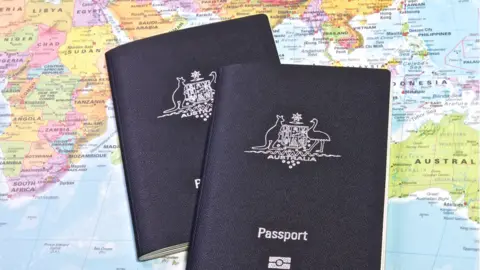 Getty Images
Getty Images'Young people at risk'
But there is serious concern that a significant number of young people might lose their Australian passports for swapping nude photos with underage partners and being charged with child pornography offences as a result.
In the state of Victoria, for example, anyone above the age of 18 convicted for possessing an explicit picture or video of someone under 18 is placed on the register for at least eight years. Those under 18 can also be registered at the discretion of judges, though there are exceptions for children caught sexting if they are close in age.
Other Australian states have similar laws.
There are likely hundreds of young people on the national register who could now lose their right to travel due to past offences like sexting, or having been in a relationship with someone under 16 when they were 18 or 19, says Katie Acheson, CEO of the Sydney-based advocacy group Youth Action.
Victoria allows those who were 18 or 19 when they committed such offences to appeal to a court have their names taken off the register, but other states don't provide that option.
"They should clean up the list first, to make sure those on it pose a significant risk to the wider community" before denying passports, she says.
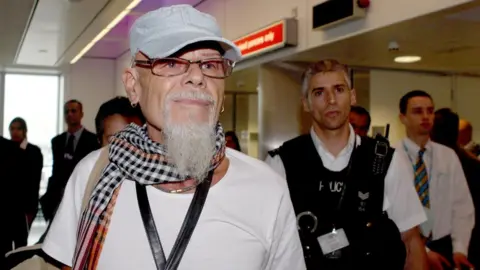 PA
PANo similar push in the UK
Recent legal changes in the UK have made it easier for authorities to restrict the travel of registered offenders.
More than 2,400 sexual harm prevention orders - which can include travel restrictions - were issued by courts in England and Wales between 8 March and 29 September 2015.
But campaigners say more needs to be done, including monitoring, though they are not yet pushing for similar legislation as Australia.
Child protection group ECPAT UK say they have documented hundreds of cases of British nationals abusing children in places like Kenya, India, Cambodia and the Philippines in recent years. A freedom of information request to the Foreign Office in 2015 found that there were 154 Britons detained in foreign countries for child sex offences.
Many British offenders abroad had convictions or had been cautioned for child sexual abuse in the UK, and the government "should be watching" what happens in Australia to see if it works, says ECPAT UK CEO Bharti Patel.
Mark Frost, who was jailed for life in February and admitted 39 sexual offences against boys in Thailand between 2009 and 2012, had a history of offences and "should have been stopped" from travelling, she says.
But an Australian-style law will not stop what she calls "situational offenders" - the large number of businesspeople or tourists who have no prior legal record of child sex offences but find themselves in a foreign country where they have access to children and commit crimes there.
For children targeted by that kind of offender, "withdrawing their passports will not help".
